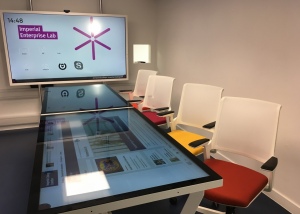Automation start-up crowned I&E Start! Challenge Winners
by Jon Narcross

HackScience won the 10,000 GBP prize in the Business School's annual Dragon's Den-style competition with their platform for automating lab processes.
HackScience beat two other finalists to win £10,000 in the annual Innovation and Entrepreneurship Start! Challenge competition held at the Business School.
HackScience offers users a platform to develop and control new tools to automate manual lab processes without the need to code.
The quality of this year’s teams was exceptionally high.
– Dr Markus Perkmann
Head of Innovation & Entrepreneurship
The team, comprising Imperial’s Ali Afshar (Chemistry), Ignacio Willats (Business School), Henry Miskin (Computer Science) and Sabin Marcu, were also supported by Dr James Bannock from the Department of Chemistry.
The event saw six finalists present throughout the day before judges whittled it down to a final three – HackScience, MagnaCare and ZiO Health.
The three teams were then invited to pitch to a panel of dragons consisting of Harveen Chugh, Managing Director of VIS-3, Colin Spiller, London Angel Club Manager, Angels Den and Graham Kennedy, Director and Principal Consultant, Alexoria.
Dr Markus Perkmann, Head of Department, Innovation & Entrepreneurship, Imperial College Business School said: “The quality of this year’s teams was exceptionally high and we were all impressed by the breadth of ideas on show. HackScience should be really proud of what they have achieved.”

Enterprise Lab
Bruno Cotta, Director, Imperial Enterprise Lab said: “Competitions such as the I&E Start Challenge show the quality of student innovation and entrepreneurship here at Imperial and help provide our students with the motivation and support they need to take their industry changing ideas to market.”
The winning team took advantage of Imperial’s new Enterprise Lab to prepare for their pitch. The College’s new experiential learning facility provides enterprising students from different disciplines the opportunity to meet, mix and develop their business ideas to the next level, working closely with Imperial’s Business School and others in the university’s growing entrepreneurial community.
HackScience
Co-founders Ali Afshar from the Department of Chemistry and Ignacio Willats from the Business School came up with the idea for HackScience from their shared desire to break down the barriers between scientists and engineers.
The calibre of the judges was so high and their questions were in-depth. It’s always good to have to defend your ideas like that way.
– Ali Afshar
HackScience
“We started by running a lab automation hack-a-thon earlier in the year. The idea was researchers could come along with manual processes and through collaborating with engineers, build prototypes to automate them.” Ali said, “The results were astounding. We had scientists from nine different fields from cancer to solar energy develop prototypes automating process which take up to three hours such as solvent dispensing and control tests for solar cells.”
Following the hack-a-thon the team realised that whilst many people could build the tools they needed, being able to control them - the next level of development - was more difficult.
HackScience offers users the ability to build their own control apps using a drag and drop editor, without the need to write any code. The apps then allow control of the tool in the cloud via the HackScience platform.
“We’re also currently developing a ‘share and discover’ platform to allow users to upload their automated tool designs and for others to search for processes they want to automate and find user-made tool designs,” Ali continued.
Using the £10,000 prize money for the competition the team are now able to fund the rest of the team to work on the project full time, continue building their own tool to automate cell cultivation, and consult with potential clients as they look to find customers to help them build their business.
As well as the prize money, the team also benefited from the support and experience of taking part in the I&E Start! Challenge Competition.
“The calibre of the judges was so high and their questions were in-depth. It’s always good to have to defend your ideas like that way as it makes you step outside your bubble and test your practices and beliefs,” Ali added.
Article text (excluding photos or graphics) © Imperial College London.
Photos and graphics subject to third party copyright used with permission or © Imperial College London.
Reporter
Jon Narcross
Communications and Public Affairs